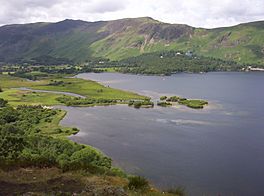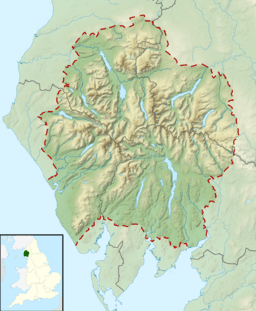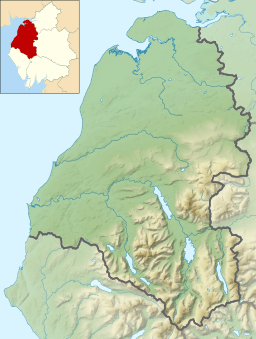Derwentwater facts for kids
Quick facts for kids Derwentwater |
|
|---|---|

Derwentwater
|
|
| Location | Lake District, England |
| Coordinates | 54°35′N 3°09′W / 54.583°N 3.150°W |
| Primary inflows | River Derwent, Watendlath Beck, Brockle Beck |
| Primary outflows | River Derwent |
| Basin countries | United Kingdom |
| Max. length | 4.6 km (2.9 mi) |
| Max. width | 1.91 km (1.19 mi) |
| Surface area | 2 sq mi (5.2 km2) |
| Average depth | 5.5 m (18 ft) |
| Max. depth | 22 m (72 ft) |
| Water volume | 29 million cubic metres (1.0×109 cu ft) |
| Residence time | 55 days |
| Shore length1 | 9.6 mi (15.4 km) |
| Surface elevation | 75 metres (246 ft) |
| Islands | 4 plus 9 small (13) |
| 1 Shore length is not a well-defined measure. | |
Derwentwater, also called Derwent Water, is a beautiful lake in the Lake District National Park in northwest England. It is located completely within the area of Allerdale, in the county of Cumbria.
The lake is found in a valley called Borrowdale. It sits just south of the town of Keswick. The River Derwent flows into and out of the lake. Derwentwater is about 3 miles (4.8 km) long and 1 mile (1.6 km) wide. It is also around 72 feet (22 m) deep.
There are several islands in the lake. One of these islands is home to people. Derwent Island House is an old house from the 1700s. It is owned by the National Trust and is open to visitors on a few days each year.
Contents
Exploring Derwentwater
Derwentwater is known for its amazing views. It is surrounded by hills, which locals call "fells." Many of the hillsides facing the lake are covered in trees.
Things to Do
You can take a boat trip on the lake. A regular passenger boat carries people between different stops. There are seven places around the lake where you can get on or off. Popular stops include Keswick, Portinscale, and the Lodore Falls. You can also rent boats at these spots.
Walking is a very popular activity here. There are many paths in the hills and woods around the lake. These paths are great for exploring the area on foot.
Getting Around
A road runs along the eastern side of the lake, connecting Keswick to Borrowdale. Buses use this road regularly. There is also a smaller road along the western side. It connects the villages of Grange and Portinscale.
Lake's Name and History
The lake's name, 'Derwent', comes from an old word meaning "river with oak trees." This name is similar to other rivers in England like Darwen and Darent. In the past, Derwentwater was also known as the 'Lake of Derwent' or 'Keswick Lake'. The lake gave its name to the Earldom of Derwentwater.
Fish in the Lake
From 2008 to 2014, people thought Derwentwater was the only place left in England where a rare fish called the vendace lived. This fish was originally found in four places. However, in 2014, a group of conservationists found a group of vendace fish living and breeding in Bassenthwaite Lake too.
Derwentwater's Islands
There are many islands in Derwentwater. The biggest ones are Derwent Island, Lord's Island, St Herbert's Island, Rampsholme Island, Park Neb, Otter Island, and Otterbield Island. St. Herbert's Island is named after a priest from the 600s, Herbert of Derwentwater.
National Trust Sculpture
At Calfclose Bay, on the shore of the lake, you can find a special sculpture. It was made by an artist named Peter Randall-Page. The National Trust asked him to create it in 1995. This was to celebrate 100 years since the National Trust was started. The sculpture is made from a large rock from the Borrowdale area. The rock was cut in half, and each side was carved into ten parts that look like a fan.
Derwentwater in Books
The writer Letitia Elizabeth Landon wrote a poem called Derwent Water. It was part of a book in 1837. The poem was written to go with a picture of Derwent Water, from the Castle Head, Cumberland by the artist Thomas Allom.
Gallery
-
From Cat Bells
Panoramas
Images for kids
See also
 In Spanish: Derwentwater para niños
In Spanish: Derwentwater para niños
 | Lonnie Johnson |
 | Granville Woods |
 | Lewis Howard Latimer |
 | James West |











